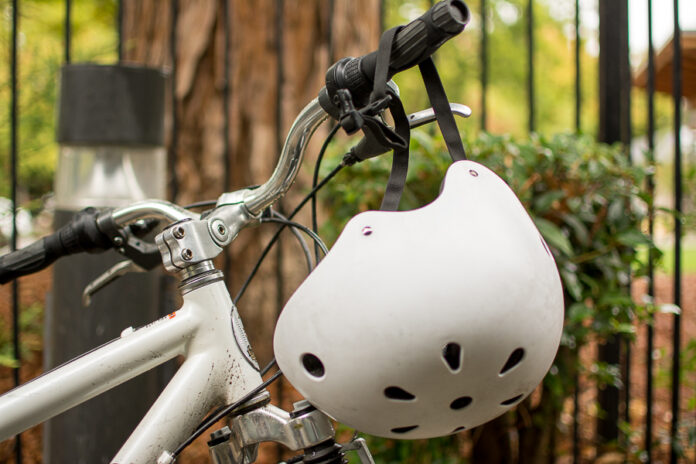Free bike helmets for pledge signers are currently out of stock, will be back Oct. 14
The Helmet Hair, Don’t Care (HHDC) campaign took its roots at UC Davis in the fall of 2016, when Student Health and Counseling Services (SHCS) partnered with the University Honors Program to address the phenomenon of students not wearing bike helmets. The HHDC pledge is sponsored by SHCS, Transportation and Parking Services (TAPS) and the Bike Barn and provides participants with a free helmet.
The pledge asks students to always wear their helmets, stating: “As a UC Davis student, I pledge to always wear a bike helmet on every ride, even on short trips, because my brain is more important than helmet hair.”
SHCS Health Promotion Specialist Shantille Connolly compared national helmet use statistics to those at UC Davis.
“When the program started, 7.9% of students were wearing bike helmets ‘mostly or always,’” Connolly said via email. “The national average usually ranges from 33-35% […] The main barriers identified were peer use, appearance and access.”
Since the pledge began, there has been a 48% increase in helmet usage on the UC Davis campus. As of winter 2019, 11.7% of students wear helmets — partly in thanks to Connolly, who not only plans the HHDC campaign, but also manages the pledge program.
“[My job] involves developing campaign designs, marketing and promoting bike helmets, coordinating logistics for the pledge program and planning events that positively recognize students for wearing bike helmets,” Connolly said.
Jack Rogers, the Bike Barn’s business manager, remembers the HHDC program from when he was a first-year student at UC Davis. His role involves “a little bit of everything” — demanding focus on administrative duties, working on repairs and helping customers.
“The Bike Barn is the easiest place to get helmets through the HHDC pledge,” Rogers said via email. “We have signage posted both in and outside about the pledge that helps spread the message to both customers and passersby. We often hand out helmets to customers who purchase bikes from us and over this past move-in weekend we handed out over 200 helmets from Friday through Monday.”
Connolly believes that the low helmet usage rate on campus — lower than the national average of 38.3% and the UC system-wide average of 43% — is largely because people feel that biking on campus and in the city is “safe.” Davis was recognized as the most bicycle-friendly city in the country by the League of American Bicyclists, and was also the first city to be presented a platinum ranking as a Bicycle Friendly Community in 2006.
“UC Davis is very bike friendly with designated bike paths and a closed campus,” Connolly said. “In short, campus is built for bikes. However, there are thousands of bikes on campus everyday (TAPS estimates at least 20,000 per day), and collisions are bound to happen.”
Second-year computer science and engineering major Nathan Wong agrees, saying that it makes no sense to not wear a helmet.
“There’s no downside,” Wong said. “If I don’t wear [a helmet] and if I get into a crash, I might be more hurt than if I’m not wearing one.”
Wong thinks one reason students forgo helmets is due to the inconvenience of carrying around a helmet. He said, however, this can be easily remedied by locking the helmet and bike up together.
“When [students] are on campus, it just feels like you don’t need a helmet as much,” Wong said. “We’re all college students. We’re teenagers and in our early twenties. We’re all stupid [and] a little bit more reckless.”
Rogers, on the other hand, thinks the ubiquity of biking in Davis is the reason students opt to go helmet-less.
“Since people ride multiple times a day and go months or years without having an accident, they come to believe that it will never happen to them,” Rogers said. “This reasoning tends to ripple out, and when incoming students see other students not wearing helmets, they follow along and think that they don’t need to either. However, accidents still happen every day on campus and brain injuries can cause serious damage.”
Coyla Munson, a first-year PhD candidate in the department of chemistry, said she wears a helmet to prevent “getting stuck in the hospital” after a collision. She said she enjoys the feeling of the breeze in her hair that comes with riding without a helmet, but at the end of the day, safety is her priority.
“After getting an undergrad [degree], you want to protect your big asset,” Munson said. “Also, don’t be fooled: as soon as you get out of this city, you will be hit by a vehicle.”
Munson said students can mix things up with colors and designs, making helmets a fashionable safety accessory — and in a worst case scenario, an identifying feature.
“I like brightly colored helmets,” Munson said. “So if my head does pop off, it can be located at a destination near my body.”
The SHCS agrees that helmets are necessary to prevent head injuries and that safety should be of the utmost priority to students.
“Students invest a lot of money in their education at UC Davis and a bike accident involving a head injury could be detrimental to their academic career,” Connolly said. “Wearing a bike helmet can prevent an injury from occurring so a bike crash won’t impact a student’s academics.”
Students interested in signing the HHDC pledge can visit the SHCS website. Free bike helmets are currently out of stock but will be available again beginning Oct. 14 at the Bike Barn.
Written by: Anjini Venugopal — features@theaggie.org






The national average involves people of all ages. The UC-Davis number is very heavily skewed towards 20 year olds, a demographic known for being arrogant and making bad decisions. To that end, I’d be interested in seeing how UC-Davis numbers compare to other universities.